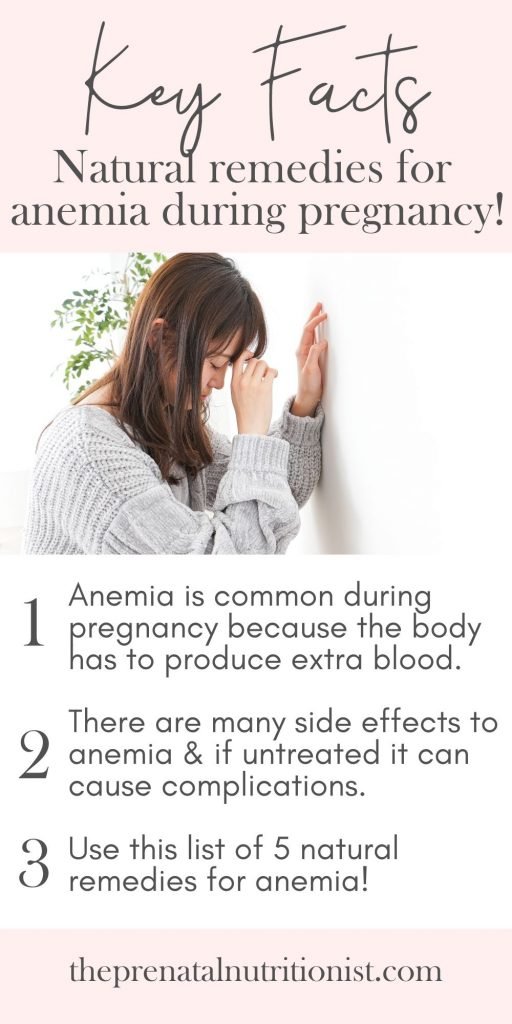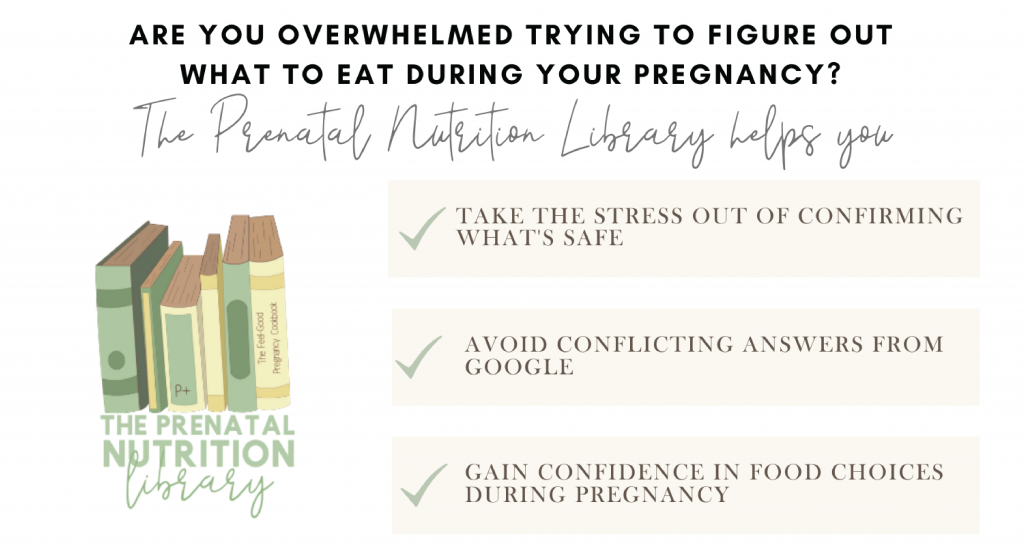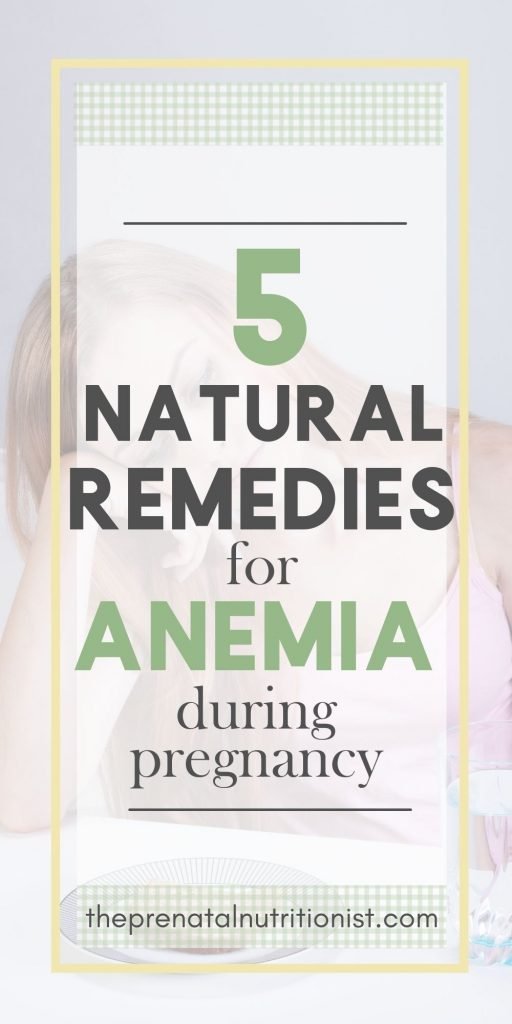
5 Natural Remedies For Anemia During Pregnancy
If you have anemia during pregnancy, you are not alone! The body goes through many changes during pregnancy, and the demand for multiple nutrients is increased. During pregnancy, the volume of blood increases, and more nutrients like iron are needed to make more red blood cells. If the body isn’t able to keep up with this demand and levels fall too low it’s called anemia.
There are multiple types of anemia. Iron-deficiency anemia (IDA) is the most common type of anemia worldwide. Anemia can also be caused by a deficiency of other nutrients, including folate, vitamin B12, and vitamin B6. Side effects and risks of anemia during pregnancy could include weakness, fatigue, shortness of breath, dizziness, chest pain, irregular heartbeat, cold hands and feet, and trouble concentrating. And, in more serious circumstances, if left untreated anemia can lead to complications like lower birth weight, premature birth, cognitive defects, or maternal depression.
Luckily, anemia is very treatable! Making sure that you are consuming enough iron and folate are two great ways to help prevent and reduce the risk of anemia. The Recommended Dietary Allowance (RDA) for iron is 27 mg per day for pregnant women. The RDA for folate is 600 mcg DFE per day for pregnant women. Iron and folate both are important for many reasons during pregnancy and both contribute to the production of healthy red blood cells and the prevention of several preterm birth conditions.
5 Natural Remedies For Anemia During Pregnancy
There are many natural ways to make sure you’re getting your body the nutrition it needs to produce plenty of healthy red blood cells. These remedies include consuming iron and folate-rich foods, consuming foods high in vitamin C, cooking with cast iron cookware, and supplementing as indicated. Let’s take a closer look at each of these remedies!
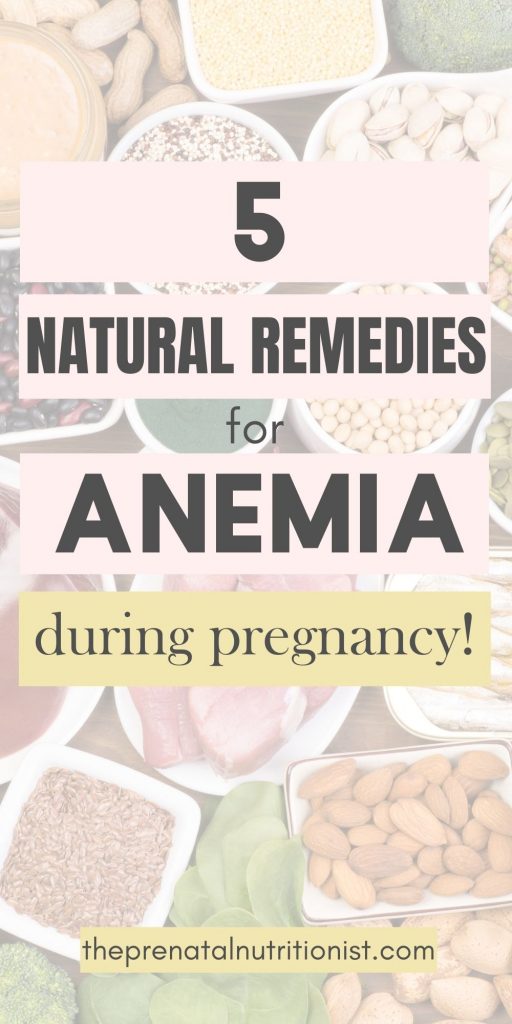
Iron-Rich Foods
Anemia can be caused by a few different deficiencies, but iron deficiency anemia (IDA) is the most common. Incorporating more iron-rich foods into your diet is a key step to preventing anemia and improving iron stores when diagnosed with IDA. The Recommended Dietary Intake (RDA) of iron for pregnant women is 27 mg per day.
Eating meat, especially red meat, is one of the best sources of heme iron. Heme sources of iron are absorbed much better by the body than non-heme sources of iron. Due to this lower absorption, vegetarians who only consume non-heme sources of iron need much more than iron than the RDA to achieve adequate iron levels.
In addition to consuming plenty of iron-rich foods, when diagnosed with IDA, it is also important to supplement with iron. Review your blood work and discuss proper dosage with your clinician.
Food Sources of Iron
Heme Iron:
- Liver (3 oz. = 9.9 mg)
- Red meat (3 oz. steak = 2.3 mg)
- Cooked oysters (3 oz = 5.9 mg)
Non-Heme Iron:
- Tofu (½ cup = 6.6 mg)
- Chickpeas (1 cup = 12.5 mg)
- Cooked spinach (1 cup = 6.5 mg)
Foods with Folate
Getting the appropriate amount of folate during pregnancy is important for many reasons. Adequate folate not only helps to prevent anemia but also promotes the healthy formation of the neural tube and proper growth of the fetus. Folate is associated with the creation of new cells and the prevention of major birth defects like anencephaly and spina bifida. Pregnant women should consume at least 600 mcg DFE each day to help promote a healthy pregnancy and delivery!
Food Sources of Folate
- Spinach (1 cup cooked = 263 mcg)
- Asparagus (4 spears cooked = 88 mcg)
- Lentils (1 cup = 358 mcg)
- Blackeye Peas (1 cup cooked from dried = 358 mcg)
- Avocado (1 oz. = 19 mcg)
- Orange (1 orange = 39 mcg)
Vitamin C
Vitamin C is a powerful antioxidant that is important for many functions in our body. Pairing vitamin C-rich foods with iron-containing foods helps to improve the absorption and bioavailability of iron. Vitamin C has properties that help the body better absorb iron from non-heme sources. Strawberries, kiwi, citrus fruits, bell peppers, tomatoes, and broccoli are a few foods rich in vitamin C. To aid your iron absorption, have your high-iron foods with vegetables and fruits!
Vitamin C + Iron Combination Examples:
- Chickpea hummus + bell peppers
- Pumpkin seeds + orange
- Baked potato with the skin + broccoli
Cooking with Cast Iron Pots and Pans
Did you know that cooking with cast iron pots and pans can actually INCREASE the iron in your food? Cooking with cast iron cookware could add up to 8 extra milligrams of iron to your meal, depending on the type of food you’re cooking! Wow! Cooking with cast iron pots and pans is a great addition, but it shouldn’t be relied on solely to prevent or treat anemia. Research has found that the type of food, age of the cookware, and cooking time may all impact the amount of iron added to foods, so it is not an absolutely sure bet.
Some foods will absorb more iron when cooking with cast iron pots and pans than other foods. Moist and acidic foods like chili, tomato sauce, scrambled eggs, bell peppers, and stews may absorb more iron from cast iron cookware. Whereas foods such as pancakes and green beans may absorb less or no iron when cooking with cast iron pans.
Prenatal Vitamins
Taking a prenatal vitamin is an excellent way to help meet needs for nutrients like folate and vitamin B12 that can lead to anemia when deficient. As well as a plethora of other essential vitamins and nutrients required during pregnancy. Iron and calcium compete for absorption so it’s ideal to choose a prenatal vitamin without both and then supplement with iron separately as indicated based on lab work. Be sure to check with your doctor before starting any new dietary supplements. Also, The Prenatal Nutrition Library has a full supplement guide on both prenatal vitamins and iron supplements which can help you decide which one is right for you.
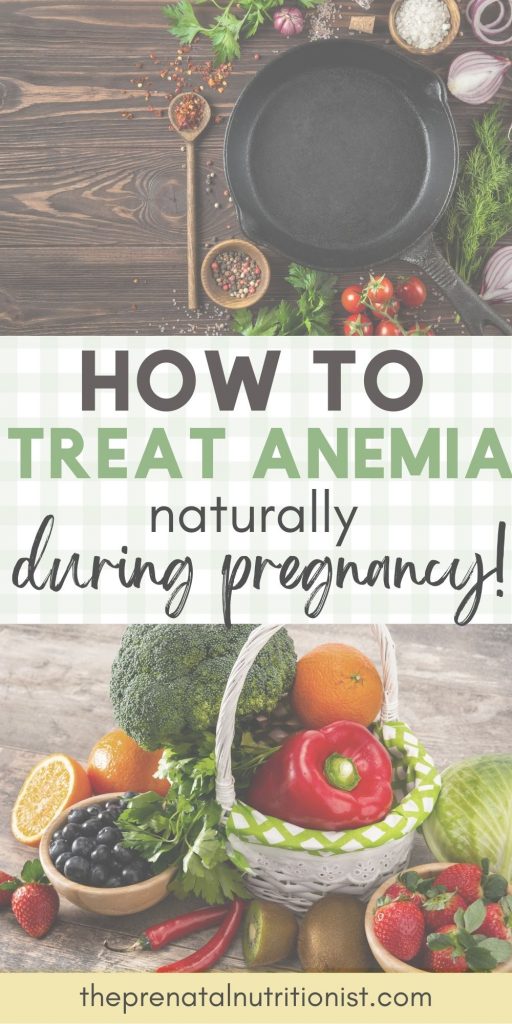
Prevent and treat anemia with food, first!
Preventing and treating anemia is important for a happy and healthy pregnancy and nutrition is a key component. Iron deficiency anemia (IDA) is the most common type of anemia, but the good news is that it is very treatable! Those who avoid animal foods are at a greater risk for deficiency. The tips above are a great place to start when trying to improve iron stores and reduce the risk of deficiency.
Be sure to keep in mind food safety when preparing fruits, vegetables, meats, and other foods listed above. To feel confident in meeting your nutrient needs for two check out The Prenatal Nutrition Library and download our app for free today to get started!
